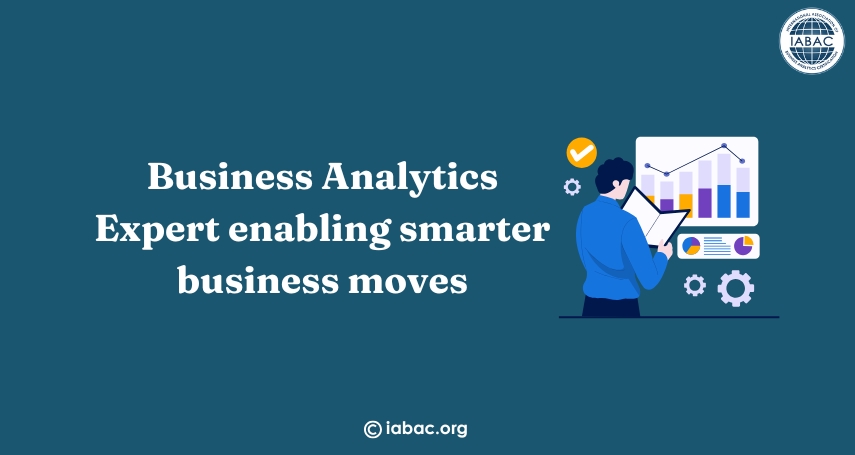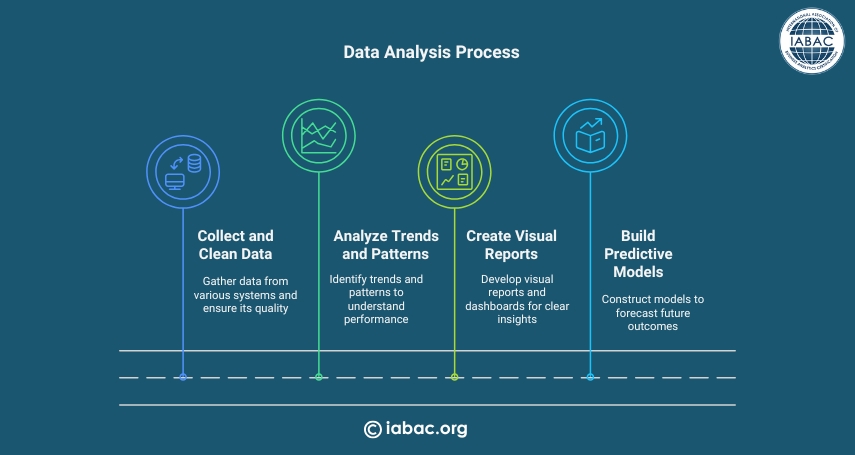
I’m a Business Analytics Expert with a passion for turning data into actionable insights. I help organizations make smarter, faster decisions by uncovering trends, optimizing processes, and driving strategic growth through analytics. Whether you're just starting or looking to refine your data approach, this space is designed to turn complex analytics into clear business value.
How I Realized the Value of Business Analytics
I used to think business decisions were all about experience and intuition. And while that’s still part of it, I soon learned that data-driven decisions are what give companies a competitive edge today. My journey to becoming a Business Analytics Expert began when I joined a company struggling with unpredictable sales, ineffective marketing, and operational inefficiencies. Everyone had opinions, but we lacked facts.
That’s when I realized I wanted to learn how to turn data into action. Becoming a Business Analytics Expert equipped me with the tools to analyze problems, predict trends, and help teams make informed decisions.
What Does a Business Analytics Expert Actually Do?
Initially, I wasn’t entirely sure what this role entailed either. But as I got deeper into the field, I realized that a Business Analytics Expert is essentially a bridge between raw data and smart decision-making. Here's what I do regularly:
Collect and clean data from systems like CRM, ERP, and customer feedback tools
Analyze trends and patterns to identify what’s working—and what’s not
Create visual reports and dashboards that make insights easy to understand
Build predictive models to forecast future demand or customer behavior
Deliver strategic recommendations grounded in real, actionable data

Why Business Analytics Is So Valuable for Companies
From my experience, companies that embrace analytics are the ones that grow faster, waste less, and serve customers better. When decisions are backed by data, guesswork is replaced with clarity, and that’s a game-changer. Here’s how I’ve seen business analytics create real impact:
Better marketing: By analyzing campaign performance, we can double down on what works and stop wasting resources on what doesn’t.
Smarter inventory: Predictive analytics helps forecast demand more accurately, reducing the costs of overstocking or running out of key products.
Customer loyalty: Data reveals patterns in customer behavior, helping us understand what keeps them coming back and how to improve their experience.
Financial planning: Budgets built on actual performance trends are far more reliable than those based on assumptions or outdated data.
Risk management: Early warning signs in the data allow us to spot issues before they escalate, whether it's a drop in sales, customer churn, or operational bottlenecks.
My Road to Becoming a Business Analytics Expert
I didn’t begin my career with analytics in mind. But over time, my curiosity about how businesses operate—and how they could operate better—led me down this path. I started asking more questions and realized the answers were often hiding in the data. That’s when things started to change. Here’s what shaped my journey:
Curiosity-driven questions: I kept wondering why campaigns failed, where processes broke down, and what really influenced customer behavior.
Hands-on learning: I taught myself tools like Excel, SQL, and Python to dig into data and find answers that mattered.
Early experiments: I built reports, created dashboards, and tested small models to help teams make sense of complex information.
Cross-functional collaboration: I worked with marketing, finance, and ops teams to align data insights with real business needs.
Problem-solving mindset: I learned to turn messy data into clear direction, using analytics to guide decisions instead of just explaining them.
What started as curiosity became a career—one that now allows me to help businesses move forward with clarity and confidence.
Tools That Help Me Every Day
If you're thinking of following this path, you’ll want to get comfortable with a few essential tools. I use these almost daily:
Excel & Google Sheets: For basic analysis, pivot tables, and quick reporting. Great for exploring data quickly or sharing simple insights.
SQL: To extract data directly from company databases. It’s the backbone of working with large datasets stored across systems.
Power BI / Tableau: To visualize trends and build interactive dashboards that help teams and stakeholders see the bigger picture.
Python (pandas, NumPy): For more advanced analysis, data cleaning, and automation. Ideal for handling large datasets and repeatable tasks.
Google Analytics: To track user behavior, website performance, and conversion funnels—especially useful in marketing and e-commerce.
CRM platforms: To connect insights back to customer actions and journey stages, helping personalize engagement and track outcomes.
The Role of a Business Analytics Certification
A Business Analytics certification isn’t just a resume booster: it’s a structured way to build confidence, sharpen your skills, and stand out in a competitive field. While hands-on experience matters most, here’s how certification has helped me and others I’ve worked with:
Structured learning: Certifications provide a clear path through core topics like data analysis, visualization, and predictive modeling.
Tool proficiency: Many programs include training in tools like Excel, SQL, Power BI, Tableau, and Python—skills you’ll use every day.
Credibility: Earning a recognized certification signals to employers and clients that you’re serious and capable in the analytics space.
Career transition: For those shifting from another field, certification can bridge the gap and show you have both the knowledge and commitment to succeed.
Networking opportunities: Some programs connect you with peers, mentors, and hiring managers, opening doors you might not expect.
Certifications won’t make you an expert overnight, but they’re a strong step in the right direction—especially when paired with real projects and consistent practice.
Real Business Problems I’ve Helped Solve
Let me give you some examples of how analytics has made a difference:
Retail: Helped a clothing company reduce returns by analyzing customer feedback and identifying issues with sizing charts.
E-commerce: Created dashboards showing top-performing products, which guided their ad spend.
HR analytics: Built a model to predict which employees were at risk of leaving, helping the company improve retention.
Logistics: Analyzed delivery delays to optimize shipping routes and warehouse staffing.
Career Opportunities for Business Analytics Experts
There are so many exciting roles you can explore once you gain confidence in analytics:
Business Analyst
Marketing Analyst
Operations Analyst
Customer Insights Analyst
Strategy and Planning Specialist
Why This Career Path Is Worth It
Business analytics is a great career if you enjoy solving problems and making decisions based on data. It helps you bring real value to any team by turning numbers into insights.
Getting started is easier than you think. I recommend exploring certifications from IABAC—they offer globally recognized programs that cover practical skills and tools you’ll use every day.
